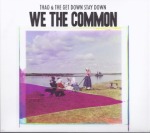Phosphorescent – Muchacho (Music Review)

Phosphorescent – Muchacho
Phosphorescent’s Muchacho album art is dominated by singer-songwriter Matthew Houck looking carefree and surrounded by topless hippie women. That, combined with song titles like “Sun, Arise! (An Invocation, An Introduction)” might lead you to assume that this is all New Age messages of positivity. Actually, the recurring theme of the songs is that love is a painful trap, and Houck is happiest when not tied down. That also explains the women, I guess. But you could be forgiven if you listened to Muchacho dozens of times and still didn’t notice what it was about, because the songs are so quiet and shapeless that they’re almost impossible to pay attention to.
Yes, this is the album with the excellent “Song for Zula”: Its haunting, looping music perfectly complements the emotionally-damaged singer who curses love by contradicting “Ring of Fire”. If Muchacho had more songs like this, I’d have loved it. But most of the rest feel incomplete, like demos or codas. In fact, it wouldn’t be too far off to think of the entire album as a suite meant to echo “Zula”. That would be ok if this were an EP.
Nothing is bad. It’s just incomplete, with songs built on a repeating lyric that goes nowhere or gentle, lulling sounds that never feel like a finished work. It’s filled with interesting fragments, though. That hippie style merges well with some modern electronic flair, and it comes across as a production geek’s loving tribute to hippie songcraft.
Phosphorescent is a promising band that doesn’t seem to have mastered the art of the song. If you want background music, Muchacho will do excellently. If you don’t, this probably won’t work. I spent months wanting to give this a chance, and it kept turning into background music no matter how hard I tried.
Grade: C









